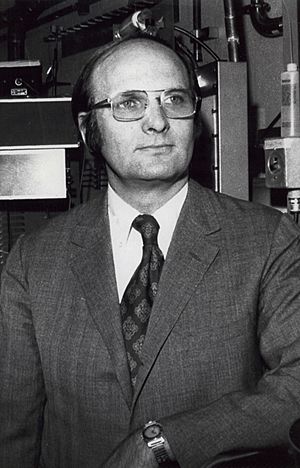John Robert Schrieffer facts for kids
Quick facts for kids
John Robert Schrieffer
|
|
|---|---|

Schrieffer in 1972
|
|
| Born | May 31, 1931 Oak Park, Illinois, U.S.
|
| Died | July 27, 2019 (aged 88) Tallahassee, Florida, U.S.
|
| Nationality | American |
| Alma mater | Massachusetts Institute of Technology University of Illinois at Urbana–Champaign |
| Known for | BCS theory Schrieffer–Wolff transformation Su-Schrieffer-Heeger model Paramagnons |
| Awards | Oliver E. Buckley Condensed Matter Prize(1968) National Medal of Science (1983) Nobel Prize in Physics (1972) Comstock Prize in Physics (1968) |
| Scientific career | |
| Fields | Condensed-matter physics |
| Institutions | University of Pennsylvania University of California, Santa Barbara University of Florida Florida State University University of Birmingham |
| Doctoral advisor | John Bardeen |
John Robert Schrieffer (May 31, 1931 – July 27, 2019) was an American physicist. He is famous for his work on superconductivity. Along with John Bardeen and Leon Cooper, he won the 1972 Nobel Prize in Physics. They received the award for creating the BCS theory. This theory was the first successful quantum theory explaining how superconductivity works.
Contents
John Robert Schrieffer's Life and Discoveries
Early Life and Education
John Robert Schrieffer was born in Oak Park, Illinois. His family moved several times during his childhood. First, they moved to Manhasset, New York in 1940. Later, in 1947, they settled in Eustis, Florida. In Florida, John enjoyed building homemade rockets. He also loved playing with ham radio. These hobbies sparked his interest in electrical engineering.
After finishing high school in 1949, John went to the Massachusetts Institute of Technology (MIT). For his first two years, he studied electrical engineering. Then, he switched to physics. He finished his bachelor's degree in 1953. He then went to the University of Illinois at Urbana–Champaign for graduate studies. There, he became a research assistant to John Bardeen.
Unlocking the Secrets of Superconductivity
While at the University of Illinois, Schrieffer joined Bardeen and Cooper. They worked together to develop a theory of superconductivity. Superconductivity is a state where certain materials can conduct electricity with zero resistance. This means no energy is lost as heat.
In January 1957, Schrieffer had a breakthrough idea. He figured out how to describe the behavior of superconducting electrons using math. Cooper had already found that electrons in a superconductor form pairs. These are called Cooper pairs. Schrieffer's idea was to describe all these pairs at once. This was a big step forward.
The day after his idea, Schrieffer showed his equations to Bardeen. Bardeen immediately knew they had found the solution. Their work led to the BCS theory. The "BCS" stands for Bardeen, Cooper, and Schrieffer. This theory finally explained many experimental results about superconductivity. These results had puzzled scientists for over 30 years.
A Distinguished Career in Physics
After earning his doctorate, Schrieffer continued his research. He spent time at the University of Birmingham in England. He also worked at the Niels Bohr Institute in Copenhagen. In 1959, he became a faculty member at the University of Illinois.
In 1962, Schrieffer joined the University of Pennsylvania in Philadelphia. He published his important book, "Theory of Superconductivity," in 1964. He received honorary degrees from several universities. In 1968, he and Cooper were awarded the Comstock Prize in Physics. He also won the Oliver E. Buckley Condensed Matter Prize that same year.
In 1972, Schrieffer, Bardeen, and Cooper received the Nobel Prize in Physics. This was for their groundbreaking BCS theory. Later, in 1980, Schrieffer became a professor at the University of California, Santa Barbara. He also directed the university's Kavli Institute for Theoretical Physics. In 1992, he moved to Florida State University. There, he continued to work on a major goal in physics: achieving superconductivity at room temperature.
John Robert Schrieffer passed away in July 2019 at the age of 88.
See also
 In Spanish: John Robert Schrieffer para niños
In Spanish: John Robert Schrieffer para niños
 | Ernest Everett Just |
 | Mary Jackson |
 | Emmett Chappelle |
 | Marie Maynard Daly |

